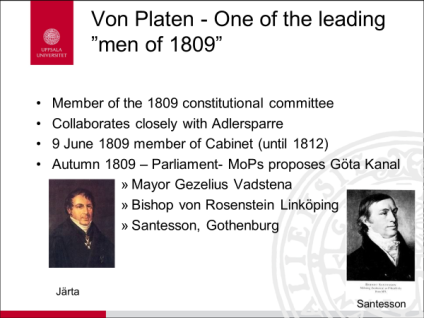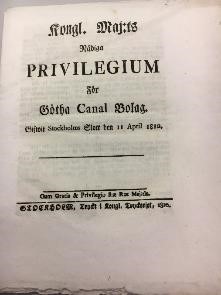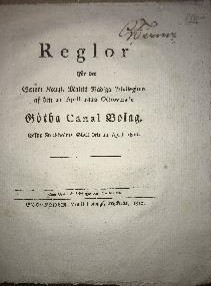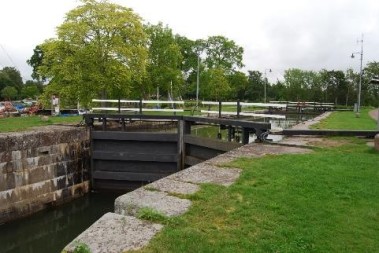A presentation of the ongoing Göta Kanal research project was made in relation to the Annual Meeting of the Association of Swedish and Norwegian Canals, held in Motala on March 31 2020. The presentation dealt with the constitutional and political environment of the Göta Kanal-project and its contemporary canal-projects the Caledonian Canal and the Eire Canal. The Göta Kanal-project and its key players was undoubtedly closely affected by and involved in the events during the 1809 revolutionary events in Sweden. Also in other countries there was a relation between these major transport infrastructure projects and general social developments.

Göta Kanal was initiated and constructed during the lates stages of what is often called the Canal Mania. The Mania was perhaps primarily a phenomenon in the UK, but influenced other countries as well. In the research project I compare Göta Kanal to the contemporary canal projects in Scotland, the Caledonian Canal and the US Erie Canal.
The three canals, though in different scales, are illustrated above.
From a constitutional point of view the projects were carried out in different environments. Göta Kanal in the midst of a constitutional upheaval, with the 1809 revolution in Sweden after the loss of Finland to Russia. Britain had a stable constitutional setting, but as for Scotland the 18th century had seen a number of conflicts, and there was a need for projects that could enhance the economy and (rural) growth in general. In New York State the Erie Canal was connected both to development and unification efforts in the wide geography of the state, but was also a project in relation to which different legal and institutional/constitutional disputes were played out, e.g. as regards the right of the federal level to engage in internal improvements of this sort.
 Baltzar von Platen, the leading person in the Göta Kanal-project, was indeed well-connected, both to the pre 1809 regime and in the new liberal constitutional monarchy from 1809. Von Platen had close contacts to the leading men of the 1809 revolution and, as a member of the Nobility, had the opportunity to become placed in the constitutional committee of the new Parliament. Von Platen was in close cooperation with one of the revolution’s most active players, Georg Adlersparre and also linked to Hans Järta, the first finance-minister in the new regime and with Santesson, who would become one of the main share holders of Göta Kanal.
Baltzar von Platen, the leading person in the Göta Kanal-project, was indeed well-connected, both to the pre 1809 regime and in the new liberal constitutional monarchy from 1809. Von Platen had close contacts to the leading men of the 1809 revolution and, as a member of the Nobility, had the opportunity to become placed in the constitutional committee of the new Parliament. Von Platen was in close cooperation with one of the revolution’s most active players, Georg Adlersparre and also linked to Hans Järta, the first finance-minister in the new regime and with Santesson, who would become one of the main share holders of Göta Kanal.
The process of actually having the Parliament to vote in favor of the Canal-proposal was in the hands of some individual Members of Parliament, where Mayor Gezelius of the city close to the Canal (Vadstena) and Santesson where instrumental. Following the discussions in Parliament during 1809 the final decisions where taken early in 1810, and the Government decided on the Privileges and Regulations of the Göta Kanal-company. Things were set in motion.

Privilege

Regulation
Left April 11 1810 privileges and right regulations of the Göta Kanal-company. The Regulations also outlined how the coming subscription of shares in the Göta Kanal company should be organized.
It should not come as a surprise, following von Platen’s close involvement in the 1809 revolutionary process, that the Canal-project would become also in the implementation of the process, closely linked to the Government. The naming of the first lock as “The Constitution” is thus perhaps more to be expected than a surprise.

The first lock of Göta Kanal from the West, into lake Vättern, The Constitution.
A further discussion of the political economy of Göta Kanal reflected in the presentation given today: Motala 200331

Comment on behalf of Deirdre McCloskey:
I didn’t know that it had shares, presumably with the expectation of profit. The US mania in the 1930s was similar, with state backed bonds, for example, mixed with private shares. It was a disaster, especially because, after all, the numerous canals were completed as the railway was coming into use. Most British canals were much earlier in the 179os. It should be noted that the Chinese Grand Canal was longer, and hundreds of years earlier, than any of the great European projects, such as the Midi from the Atlantic tot he Mediterranean in France, or the much later Kiel Canal or the Amsterdam Ship Canal.
LikeLike